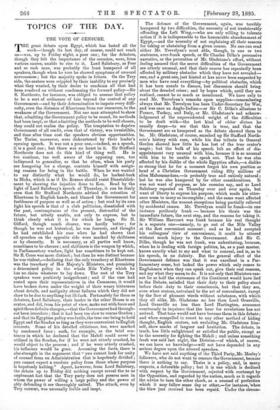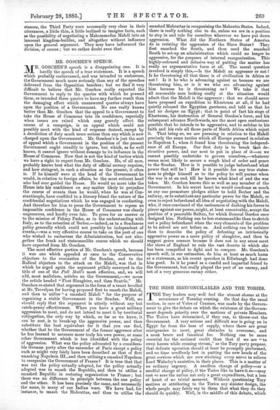TOPICS OF TIIE DAY.
THE great debate upon Egypt, which has lasted all the week—though its last day, of course, could not reach us—was, up to Friday night, a poor one ; for the debaters, though they felt the importance of the occasion, were, from various causes, unable to rise to it. Lord Salisbury, as Peer and as rash man, was probably the least hampered of all speakers, though when he rose he showed symptoms of unusual nervousness ; but the majority spoke in fetters. On the Tory side, the orators were crippled by their inability to say precisely what they wanted, by their desire to condemn all that had been resolved on without condemning the forward policy—Sir S. Northcote, for instance, was obliged to assume that policy to be a sort of ordinance of fate beyond the control of any Government—and by their determination to impute every difficulty, even the distance of Khartoum from our resources, to the weakness of the Government. Not one man attempted to show that, admitting the Government policy to be sound, its methods had been inept, or that admitting the methods to be well chosen, they could not realise the policy. The temptation to deprive Government of all credit, even that of victory, was irresistible, and time after time cost the speakers obvious opportunities. The Tories, moreover, were disheartened by their leader's opening speech. It was not a poor one,—indeed, as a speech, it is a good one ; but there was no heart in it. Sir Stafford Northcote does not do this kind of thing well. He is too cautious, too well aware of the opposing case, too indisposed to generalise, so that he often, when his party are hungering for a charge, contents himself with assigning reasons for being in the battle. When he was wanted • to say distinctly what he would do, he harked-back to Hicks, which is as if Dr. Benson should resist Disestablishment by showing the injustice done to Ken. Read by the light of Lord Salisbury's speech of Thursday, it can be dimly seen that Sir Stafford Northcote advised the retention of Khartoum in English hands, and blamed the Government for • feebleness of purpose as well as of action ; but read by its own light his speech is that of a club politician, dissatisfied with the past, contemptuous of the present, distrustful of the future, but utterly unable, not only to express, but to think clearly what it is for which he longs. Sir H. Giffard, though much clearer, was hardly better ; for though he was not historical, he was forensic, and thought he had established his case when he had shown that all speeches on the opposite side were marked by shiftiness or by obscurity. It is necessary, as all parties well know, sometimes to be obscure ; and shiftiness is the weapon by which, in Parliamentary warfare, light has sometimes to be kept out. Sir R. Cross was more distinct ; but then he was distinct because he was violent,—declaring that the only treachery at Khartoum was the treachery of Her Majesty's Ministers, and promising a determined policy in the whole Nile Valley which he has no claim whatever to lay down. The rest of the Tory speakers were positively insignificant ; and if the case had rested upon their representatives in the Commons, it would have broken down under the weight of their weary bitterness about details, and malignity about failures which they did not show to be due to anything but ill-luck. Fortunately for them as debaters, Lord Salisbury, their leader in the other House is an orator, and did, from his point of view, make out with force and spirit three definite charges,—that the Government had throughout been irresolute ; that it had been too slow to rescue Gordon ; and that its Egyptian policy was futile, the true one being to hold Egypt and the Soudan as long as they were convenient to English interests. Some of his detailed criticisms, too, were marked by condensed force ; such, for example, as the brief sentences in which he declared that the Mahdi could never be utilised in the Soudan, for if he were not utterly crushed, he would object to the process ; and if he were utterly crushed, his influence would be gone. Assuming the facts, there is also strength in the argument that "you cannot look for unity of counsel from an Administration that is hopelessly divided ; you cannot expect a resolute policy from those whose purpose is hopelessly halting." Apart, however, from Lord Salisbury, the debate up to Friday did nothing except reveal the to us unpleasant fact that the Tory party does not possess men in whom the power of willing a large policy and the power of ably defending it are thoroughly united. The attack, even by Tory consent, was unusually feeble and inept. The defence of the Government, again, was terribly hampered by two difficulties, the necessity of not irretrievably offending the Left Wing,—who are only willing to tolerate action if it is indispensable to the honourable abandonment of Egypt,—and the necessity of not explaining all their reasons for taking or abstaining from a given course. No one can read either Mr. Trevelyan's most able, though, in one or two sentences, over-frank speech, or Sir Charles Mike's persuasive narrative, or the peroration of Mr. Gladstone's effort, without feeling assured that the secret difficulties of the Government are utterly unusual, and that their course has repeatedly been affected by military obstacles which they have not revealed— one, and a great one, just hinted at has never been suspected by men who have read everything—by political obstacles, which it has been unsafe to discuss, lest discussion should bring about the dreaded crises ; and by hopes which, until they are realised, cannot be so much as mentioned. We have only to read Mr. Trevelyan's remarks upon supplies—remembering always that Mr. Trevelyan has been Under-Secretary for War, and was once an Anglo-Indian—or Sir C. Dilke's allusions to France, Turkey, and Italy, or Mr. Gladstone's sad acknowledgement of the unprecedented weight of the difficulties to be dealt with—the last kind of obiter dictum he usually drops—to see that this is true, and that the Government are as hampered as the debate showed them to be. Mr. Gladstone, of course, smashed up Sir Stafford Northcote's history with ease, while his fine tribute to General Gordon showed how little he has lost of the true orator's magic ; but the bulk of his speech left an effect of disappointment very unusual with him, because it is so unusual with him to be unable to speak out. That he was also affected by his dislike of the whole Egyptian affair,—a dislike so strong that he for a moment forgot his own position as head of a Christian Government ruling fifty millions of alien Mahommedans,—is probably true and" entirely natural ; but he was also hampered by far other considerations. It was not want of purpose, as his enemies say, and as Lord Salisbury repeated on Thursday over and over again, but want of liberty to express his purpose, which made his utterance seem to many so incomplete ; and the same want affected other Ministers, the nearest exceptions being partially relieved by accidental causes. Mr. Trevelyan could be frank—in one instance perilously frank — because his thesis was the immediate future, the next step, and the reasons for taking it. Sir William Harcourt was frank because his real thought is a separate one—namely, to go out of the Nile Valley at the first convenient moment ; and as he had accepted his colleagues' view of convenience, it could be uttered without much injury to the Government. And Sir C. Dilke, though he was not frank, was unhesitating, because, when he is dealing with foreign politics, he, as a past master, knows exactly what to say and what to conceal, and is, as to his speech, in no dubiety. Bat the general effect of the Government defence was that it was excellent in a Parliamentary sense, but lacked the power which only comes to Englishmen when they can speak out, give their real reasons, and say what they mean to do. It is not only that Ministers cannot lie as half the statesmen of the Continent would have lied in the Debate, satisfied that their duty to their policy stood before their . duty to their consciences, bat that they are, even when orators, untrained to the art of concealment, except by the flow of pleasant Words without substance, with which they all alike, Mr. Gladstone no less than Lord Granville, Lord Granville no less than Lord Hartington, announce courteously to inquirers that the hour for revelations has not arrived. That tone would not have become them in this debate ; and when compelled to resort to any other method of hiding thought, English orators, not excluding Mr. Gladstone himself, show marks of languor and hesitation. The debate, in truth, has little enlightened or satisfied the public, except as to the neeessity for fighting the Mahdi ; and unless something fresh was said last night, the Division—of which, of course, we can have no knowledge—will not have depended in any serious degree upon the uttered speeches. We have not said anything of the Third Party, Mr. Morley's followers, who do not want to censure the Government, because there is nothing to say. Theirs is a policy, arid, in many respects, a defensible policy ; but it is one which is declined with respect by the Government, rejected with contempt by the Opposition, and regarded by the nation, much as it regards the advice to turn the other cheek, as a counsel of perfection which it may follow some day or other,—for instance, when the blow just received has been repaid. Under the circum stances, the Third Party were necessarily very clear in their utterances, a little thin, a little inclined to imagine facts, such as the possibility of negotiating a Mahommedan Mahdi into an innocent kingdom-builder, and altogether without influence upon the general argument. They may have influenced the division, of course ; but we rather doubt even that.



































 Previous page
Previous page